Israel has bombed areas of southern Gaza where it told Palestinians to flee ahead of an expected invasion, killing dozens of people.
Violence along Israel’s border with Lebanon has also led to concerns over a widening regional conflict that diplomats have been working to prevent.
In Gaza, people wounded in the air strikes were rushed to hospital after heavy attacks outside the southern cities of Rafah and Khan Younis, residents reported.
Hamas’ military wing, the Qassam Brigades, said that an Israeli air strike in the central Gaza Strip killed one of its top commanders.
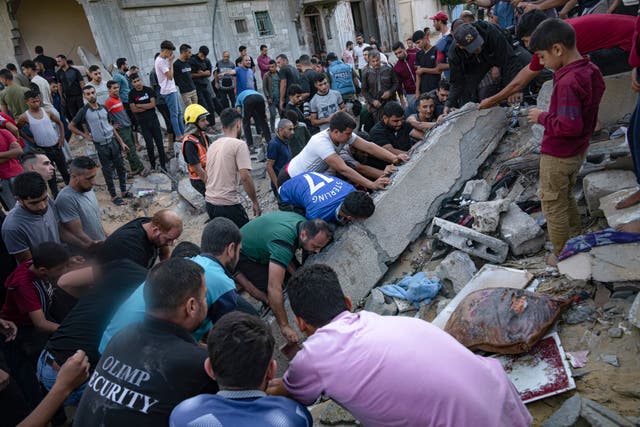
Basem Naim, a senior Hamas official and former health minister, reported 27 people were killed in Rafah and 30 in Khan Younis.
An Associated Press reporter saw around 50 bodies brought to Nasser Hospital in Khan Younis. Family members came to claim the bodies, wrapped in white bedsheets, some soaked in blood.
Elsewhwere, the UN agency for Palestinians said at least six people were killed when one of its schools in the central Gaza Strip was hit on Tuesday.
Philippe Lazzarini, UNRWA commissioner general, said dozens of people were also injured, including agency staff, when the UNRWA school in the al-Maghazi refugee camp came under bombardment.
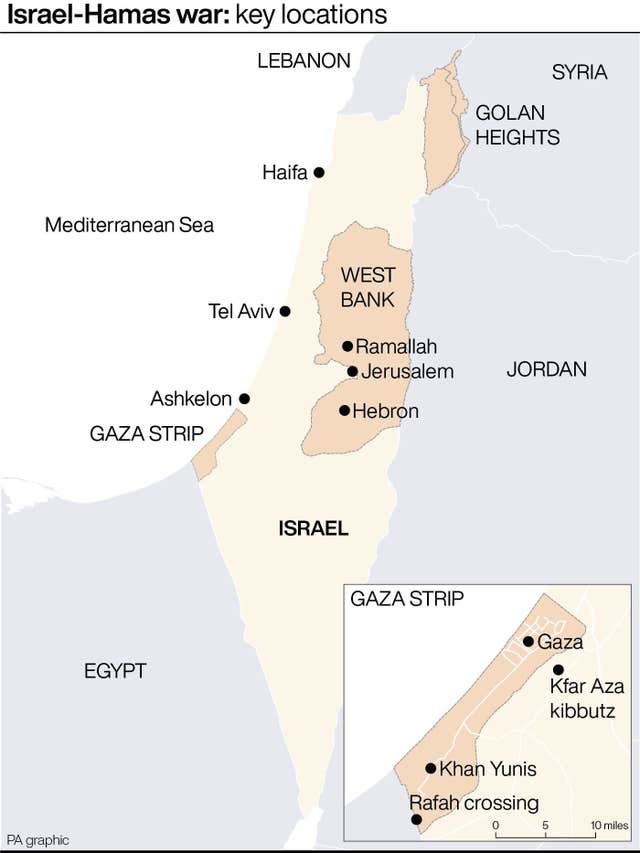
“This is outrageous and it again shows a flagrant disregard for the lives of civilians,” Mr Lazzarini said in a statement. “No place is safe in Gaza anymore, not even UNRWA facilities.”
An air strike in Deir al Balah reduced a house to rubble, killing nine members of the family living there. Three members of another family that had evacuated from Gaza City were killed in a neighbouring home. The dead included one man and 11 women and children. Witnesses said there was no warning before the strike.
The Israeli military said it was targeting Hamas hideouts, infrastructure and command centres.
“When we see a target, when we see something moving that is Hamas, we’ll take care of it. We’ll handle it,” said Richard Hecht, an Israeli military spokesman.
However, Iran’s foreign minister warned that “pre-emptive action is possible” if Israel moves closer to a ground offensive. Hossein Amirabdollahian’s threat followed a pattern of escalating rhetoric from Iran, which supports Hamas.
Israel has sealed off and bombed Hamas-ruled Gaza since the militant attack on southern Israel on October 7 killed over 1,400 people, mostly civilians, and left about 200 hostages held captive in Gaza.
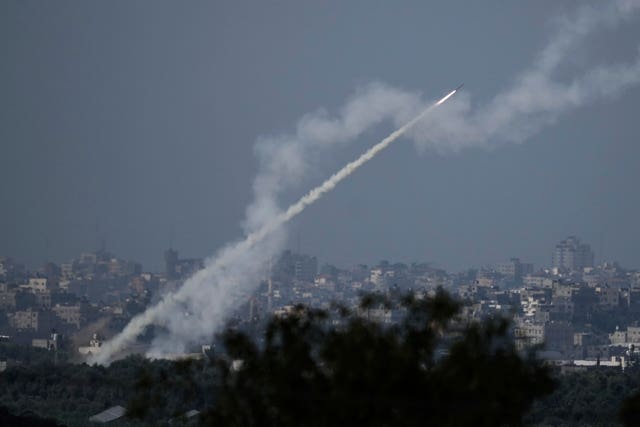
The strikes have not stopped Hamas militants from continuing to attack Israel with rockets launched from Gaza.
Another 1,200 people across Gaza are believed buried under the rubble, health authorities said.
Emergency teams struggled to rescue people while cut off from the internet and mobile networks, running out of fuel and exposed to unceasing air strikes.
On Monday, Israeli warplanes struck the headquarters of the Civil Defence in Gaza City, killing seven paramedics. Another 10 medics and doctors have been killed on the job, health authorities said.
Israel has massed troops at the border for an expected ground offensive, but Mr Hecht said on Tuesday that no concrete decisions have been made.
“These plans are being developed. They will be decided by, and presented to, our political leadership,” he said.
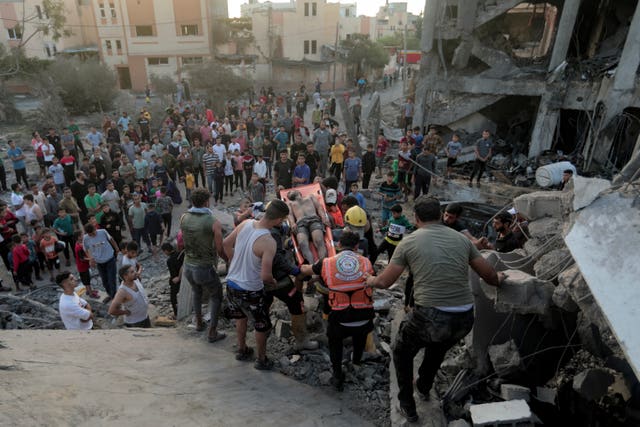
More than 1 million Palestinians have fled their homes, and 60% are now in the approximately eight-mile area south of the evacuation zone, the UN said. Aid workers warned that the territory was near complete collapse with ever-decreasing supplies of water and medicine and with power running out at hospitals.
At the Rafah crossing, Gaza’s only connection to Egypt, truckloads of aid were waiting to go into the tiny, densely populated territory, and trapped civilians — many of them Palestinians with dual nationalities — were hoping desperately to get out.
Mediators were trying to reach a ceasefire to open the border, which shut down last week after Israeli air strikes. An agreement appeared to have been reached on Monday, but Israel denied reports of a ceasefire in Rafah, which would be needed to open the gates. On Tuesday morning, they were still closed.
Later, a senior Egyptian official said Egypt is still negotiating with Israel on the delivery of humanitarian assistance and fuel to Gaza from its crossing points, Rafah and Kerem Shalom.
The official said Israel is searching all aid deliveries and wants to “ensure that such aid won’t benefit Hamas”.
He said they are also negotiating a compromise that would allow foreign passport holders to cross into Egypt. Egypt has proposed that the United Nations oversee the process with help from Egyptian forces, the official said. Israel has yet to respond to the proposal.
The US, Qatar, the UN and several European countries are involved in the talks, which are led by security agencies in Egypt and Israel, the official said.
Mr Biden will also travel to Jordan to meet Arab leaders amid fears the fighting could expand into a broader regional conflict as fighting intensified along Israel’s border with Lebanon.
US Secretary of State Antony Blinken, who visited Israel for the second time in a week on Monday after a six-country tour through Arab nations, said in Tel Aviv that the US and Israel had agreed to develop a plan to enable humanitarian aid to reach civilians in Gaza.
There were few details, but the plan would include “the possibility of creating areas to help keep civilians out of harm’s way”, he said.
In Gaza, hospitals were on the verge of losing electricity, threatening the lives of thousands of patients, and hundreds of thousands of Palestinians displaced from their homes searched for bread.
With taps dry, many rationed the little clean water available and others resorted to drinking dirty or sewage-filled water, risking the spread of disease.
The Israeli military said it was trying to clear civilians for their safety ahead of a major campaign against Hamas in Gaza’s north, where it says the militants have extensive networks of tunnels and rocket launchers. Much of Hamas’ military infrastructure is in residential areas.
Israel evacuated towns near its northern border with Lebanon, where the military has exchanged fire repeatedly with the Iranian-backed Hezbollah group.
Israel fought a vicious month-long war with Hezbollah in 2006 that ended in a stalemate and a tense detente between the two sides.
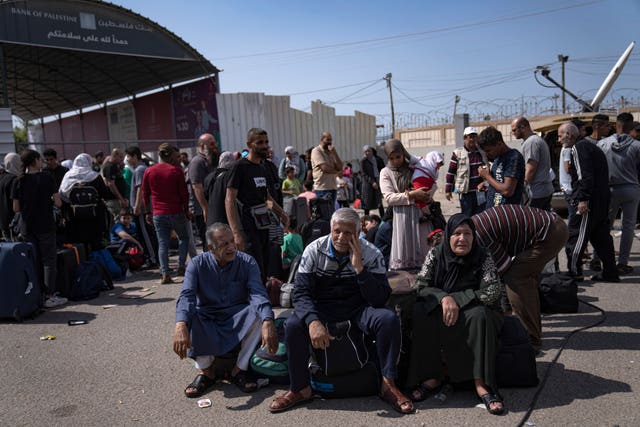
It marked the largest number of casualties for the militant group in a single day as tensions with Israel escalate.
Speaking to the Israeli Knesset, Prime Minister Benjamin Netanyahu warned Iran and Hezbollah: “Don’t test us in the north. Don’t make the mistake of the past. Today, the price you will pay will be far heavier.”
Soon after he spoke, the Knesset floor was evacuated as rockets headed toward Jerusalem. Sirens in Tel Aviv prompted US and Israeli officials to take shelter in a bunker, officials said.
The Israeli military said on Monday at least 199 hostages were taken into Gaza, more than previously estimated. Hamas said it was holding 200 to 250 hostages.
Hamas’ military wing released a hostage video showing a dazed woman having her arm wrapped with bandages. The woman, who identified herself as Mia Schem, 21, rocked slightly as she spoke, the sound of explosions reverberating in the background.
The plight of the hostages has dominated the Israeli media since the attack, with interviews with their relatives playing on television almost constantly. Israeli officials have vowed to maintain the siege of Gaza until the hostages are released.






